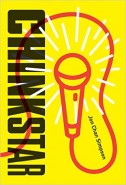
Book Review: Chinkstar by Jon Chan Simpson

Chinkstar
Fiction by Jon Chan Simpson
Coach House Books, June 2015
ISBN-13: 978-1552453063
$18.95; 208 pp.
Reviewed by Rebecca Skidmore Biggio
What is Chinksta? For the youth culture in Jon Chan Simpson’s debut novel, it is more than “rice rap” or “nip-hop.” Chinksta is a linguistic reimagining of old world heroes for a new millennium:
The bawse hears of the Tao and practices it diligently.
The middling-ass mof hears of the Tao and gives it thought now and again.
The hater hears of the Tao and laughs aloud.
If there were no laughter, the Tao would not be what it is.
In Chinkstar, reluctant hero Run finds himself on a quest to locate his missing rap-star brother, King Kwong. As in any good quest narrative, Run must embark on a more personal journey of self-discovery in order to overcome the obstacles he encounters along his path.
With Kwong’s disappearance, Run is forced to confront his own preconceptions and judgments—about his brother, his parents, Chinksta culture, and even the Necks, a rival gang he suspects is responsible for kidnapping Kwong and wounding their mom in a drive-by: “Abduction, gunshots, commando dads, street-poet moms. In my world, blood stayed on the inside of people, but my world was changing, and as I caught myself in the doorframe I wondered if the whole thing had disappeared with Kwong.” Regardless of Run’s feelings for his brother, Kwong is a force of nature, and his absence leaves a void in their hometown of Red Deer, Alberta, and in Chinksta culture, that Run finds himself ambivalent about stepping into. “‘I get you Run,’” his girl, Ros, tells him. “‘This thing—chinksta.’ She stumbled over the word at first but pulled herself through it. ‘You’re worried it’s all you got.’ She said. ‘This is all you got, and you’re not even sure it’s yours.’”
Kwong, on the other hand, is always sure: “He took the things around him—oil rigs, hockey, burgers and beer, bleach blondes and mustangs and mud, yellow mom and white-ass dad, sweet-and-sour take on ethnic—and like a mad-genius boyscout converted it into some kind of chinksta lean-to out there in the cultural sticks.” Run has always thought of Kwong as a thug, but he grudgingly admits that Kwong has a special blend of self-possession and charisma that Run yearns to understand.
Run is aided in his quest by a diverse cast of characters, each of whom brings a unique perspective to his search. Ali is Run’s longtime friend who, as a black kid, is the consummate outsider in a world where the two rival gangs are divided along racial lines—the Asian Apes and the white Necks. Linh, Kwong’s girlfriend, is a true believer, telling Run, “Chinksta begins and ends with the Tao. The Tao is . . . original lyric.” Ros is Run’s longtime crush, and the beloved little sister of the Neck’s leader, Grey. Grey himself becomes an ally of sorts, helping Run to understand that the Ape Rising, the battle which marked the beginning of the Chinksta Movement,
wasn’t about the lost teeth or broken bodies—those things didn’t stick with anybody deep down. Something tectonic happened that green-skyed evening, a shift in the blood you felt but couldn’t comprehend—just too big. By the laws of our universe, a shift must’ve happened on the other side, too, equal but different and no less disruptive. The way wasn’t easy for anyone, I realized.
Random fanboys; Sonny Chu, the proprietor of “kru HQ”; and an aptly-named policeman Run knows only as Nutjob: each of the myriad characters who help Run along his journey are inspired by their respect for Kwong and the Movement, and, increasingly, for Run in his own right.
As Run’s quest progresses, the wisdom of Lao Tsu’s original Tao Te Ching (remixed, of course) and stories of Run’s grandfather A-Gung, the original chinksta, intertwine with the events of Run’s present, as Run begins to see the connections between his brother, his ancestors, and a way of life that is as noble as it is violent. Chan’s rhythmic language is young and fun, and his combination of adventure quest motif and bildungsroman is delightfully wacky at times. The narrative remains believable despite brief moments of incredulity—like when Run’s mom takes a bullet to the shoulder and starts yelling in chinksta dialect “like a Compton minimart queen”—because Run himself is hilariously incredulous right along with the reader. The wild ride of Run’s journey takes him from hater to bawse as he begins to understand that Chinksta is cultural heritage and a future all rolled into one. Chinksta is hope.
Rebecca Skidmore Biggio is a Mentor for the Afghan Women’s Writing Project. Her critical essays have appeared in Arizona Quarterly and African American Review.

Leave a Reply